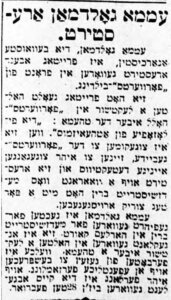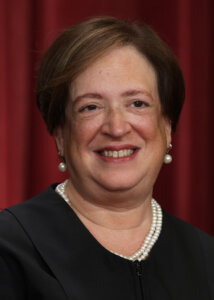Why was Emma Goldman arrested at the Forward in 1916? Blame a law cited by the Supreme Court Tuesday
The abortion case argued Tuesday referenced the 19th-century Comstock Act. Goldman faced related charges for talking about contraception

Emma Goldman. Photo by Chicago Sun-Times/Chicago Daily News collection/Chicago History Museum/Getty Images
The Comstock Act, once used against the famed Jewish anarchist Emma Goldman, was mentioned several times Tuesday in a case before the U.S. Supreme Court about abortion. The case could determine whether doctors can continue to mail the abortion drug mifepristone to patients who want to end their pregnancies.

“This statute has not been enforced for nearly 100 years,” Jessica Ellsworth, lawyer for Danco Labs, which manufactures the abortion pill, told the justices when asked about the Comstock Act. The federal law passed by Congress in 1873 made it illegal to mail “lewd” material, including any “article, instrument, substance, drug, medicine, or thing” used to induce abortion.
One of the most famous people ever arrested for violating a state law derived from the Comstock Act was Goldman, a radical proponent of free love. And that arrest took place at the Forward Building on the Lower East Side.
‘A topic that is illegal’

Goldman was arrested at the Forward on Feb. 11, 1916, for giving a talk about birth control a month earlier elsewhere in the city. She was at the Forward Building that day to speak about another of her favorite topics — atheism. One report said 1,000 people had shown up to hear her, and hundreds of them jeered at the police as she was taken away.
A short item about her arrest in the Forward’s original Yiddish newspaper, the Forverts, didn’t mention birth control. Instead, it said her arrest was prompted by a lecture she’d given “on a topic that is illegal and forbidden to present to a public gathering.”
Since the Comstock Act was a federal law that could only regulate what was sent through the U.S. mail, New York and a number of other states echoed and furthered the law by criminalizing all activities promoting contraception within state borders. Those so-called mirror laws were known as “little Comstock laws.”
Goldman was eventually tried and convicted, and spent 15 days in jail in Queens rather than pay a $100 fine. Birth control crusader Margaret Sanger was also charged in New York under the law.
The case now before the court
Last year, a judge in Texas ruled that the U.S. Food and Drug Administration had violated the Comstock Act by permitting doctors to dispense the abortion drug through the mail.
Although the Comstock Act was cited several times in the High Court Tuesday, it appeared from most of the justices’ questions — even from conservative justices like Amy Coney Barrett — that their decision was not likely to hinge on an interpretation of that 19th-century law.
Instead, the justices on both the right and the left seemed more concerned with whether the plaintiff had legal standing to challenge the policy that permits the drug to be mailed. The FDA decided to allow doctors to dispense the drug without in-person consultations after numerous studies showed that it was extremely safe.

The entity challenging the FDA policy, the Alliance for Hippocratic Medicine, claimed that doctors who object to abortion on religious grounds could hypothetically be compelled to treat someone in an emergency room who took the drug and whose abortion was incomplete.
The lawyer for the drug company, along with U.S. Solicitor General Elizabeth Prelogar, who was representing the FDA, argued that legal protection and protoocols already exist for doctors to opt out if they do not want to treat a patient for “conscience” reasons. Many of the comments made by the justices suggested that they agreed.
Elena Kagan, the court’s sole Jewish justice, said the plaintiff’s “theory” depended on having someone meet the court’s requirement for standing. “You need a person,” Kagan said. “Who’s your person?”
She and other justices seemed skeptical of written statements from two doctors who said they were worried they might be required to treat a case where the drug did not successfully terminate the patient’s pregnancy.
This story was reported using research by Forward archivist Chana Pollack.























